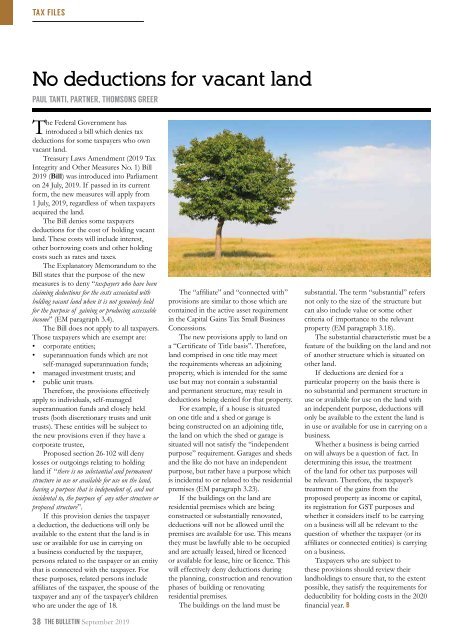LSB September 2019_Web
You also want an ePaper? Increase the reach of your titles
YUMPU automatically turns print PDFs into web optimized ePapers that Google loves.
TAX FILES<br />
No deductions for vacant land<br />
PAUL TANTI, PARTNER, THOMSONS GREER<br />
The Federal Government has<br />
introduced a bill which denies tax<br />
deductions for some taxpayers who own<br />
vacant land.<br />
Treasury Laws Amendment (<strong>2019</strong> Tax<br />
Integrity and Other Measures No. 1) Bill<br />
<strong>2019</strong> (Bill) was introduced into Parliament<br />
on 24 July, <strong>2019</strong>. If passed in its current<br />
form, the new measures will apply from<br />
1 July, <strong>2019</strong>, regardless of when taxpayers<br />
acquired the land.<br />
The Bill denies some taxpayers<br />
deductions for the cost of holding vacant<br />
land. These costs will include interest,<br />
other borrowing costs and other holding<br />
costs such as rates and taxes.<br />
The Explanatory Memorandum to the<br />
Bill states that the purpose of the new<br />
measures is to deny “taxpayers who have been<br />
claiming deductions for the costs associated with<br />
holding vacant land when it is not genuinely held<br />
for the purpose of gaining or producing assessable<br />
income” (EM paragraph 3.4).<br />
The Bill does not apply to all taxpayers.<br />
Those taxpayers which are exempt are:<br />
• corporate entities;<br />
• superannuation funds which are not<br />
self-managed superannuation funds;<br />
• managed investment trusts; and<br />
• public unit trusts.<br />
Therefore, the provisions effectively<br />
apply to individuals, self-managed<br />
superannuation funds and closely held<br />
trusts (both discretionary trusts and unit<br />
trusts). These entities will be subject to<br />
the new provisions even if they have a<br />
corporate trustee,<br />
Proposed section 26-102 will deny<br />
losses or outgoings relating to holding<br />
land if “there is no substantial and permanent<br />
structure in use or available for use on the land,<br />
having a purpose that is independent of, and not<br />
incidental to, the purpose of any other structure or<br />
proposed structure”.<br />
If this provision denies the taxpayer<br />
a deduction, the deductions will only be<br />
available to the extent that the land is in<br />
use or available for use in carrying on<br />
a business conducted by the taxpayer,<br />
persons related to the taxpayer or an entity<br />
that is connected with the taxpayer. For<br />
these purposes, related persons include<br />
affiliates of the taxpayer, the spouse of the<br />
taxpayer and any of the taxpayer’s children<br />
who are under the age of 18.<br />
38 THE BULLETIN <strong>September</strong> <strong>2019</strong><br />
The “affiliate” and “connected with”<br />
provisions are similar to those which are<br />
contained in the active asset requirement<br />
in the Capital Gains Tax Small Business<br />
Concessions.<br />
The new provisions apply to land on<br />
a “Certificate of Title basis”. Therefore,<br />
land comprised in one title may meet<br />
the requirements whereas an adjoining<br />
property, which is intended for the same<br />
use but may not contain a substantial<br />
and permanent structure, may result in<br />
deductions being denied for that property.<br />
For example, if a house is situated<br />
on one title and a shed or garage is<br />
being constructed on an adjoining title,<br />
the land on which the shed or garage is<br />
situated will not satisfy the “independent<br />
purpose” requirement. Garages and sheds<br />
and the like do not have an independent<br />
purpose, but rather have a purpose which<br />
is incidental to or related to the residential<br />
premises (EM paragraph 3.23).<br />
If the buildings on the land are<br />
residential premises which are being<br />
constructed or substantially renovated,<br />
deductions will not be allowed until the<br />
premises are available for use. This means<br />
they must be lawfully able to be occupied<br />
and are actually leased, hired or licenced<br />
or available for lease, hire or licence. This<br />
will effectively deny deductions during<br />
the planning, construction and renovation<br />
phases of building or renovating<br />
residential premises.<br />
The buildings on the land must be<br />
substantial. The term “substantial” refers<br />
not only to the size of the structure but<br />
can also include value or some other<br />
criteria of importance to the relevant<br />
property (EM paragraph 3.18).<br />
The substantial characteristic must be a<br />
feature of the building on the land and not<br />
of another structure which is situated on<br />
other land.<br />
If deductions are denied for a<br />
particular property on the basis there is<br />
no substantial and permanent structure in<br />
use or available for use on the land with<br />
an independent purpose, deductions will<br />
only be available to the extent the land is<br />
in use or available for use in carrying on a<br />
business.<br />
Whether a business is being carried<br />
on will always be a question of fact. In<br />
determining this issue, the treatment<br />
of the land for other tax purposes will<br />
be relevant. Therefore, the taxpayer’s<br />
treatment of the gains from the<br />
proposed property as income or capital,<br />
its registration for GST purposes and<br />
whether it considers itself to be carrying<br />
on a business will all be relevant to the<br />
question of whether the taxpayer (or its<br />
affiliates or connected entities) is carrying<br />
on a business.<br />
Taxpayers who are subject to<br />
these provisions should review their<br />
landholdings to ensure that, to the extent<br />
possible, they satisfy the requirements for<br />
deductibility for holding costs in the 2020<br />
financial year. B


















